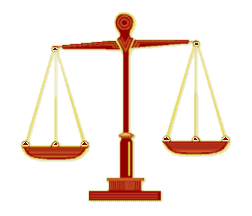Due process facts for kids
Due process is a really important idea in law. It means that the government must always follow fair rules and respect everyone's legal rights. Think of it like this: the government has a lot of power, but due process makes sure that power is used fairly. It protects you from the government doing something unfair or harming you without following the exact law. If the government doesn't follow these rules, it's called a due process violation, and it goes against the idea of the rule of law.
Contents
What Due Process Means for You
Due process often means that judges, not just lawmakers, can make sure laws and legal actions are fair. This helps to guarantee that everyone gets justice and liberty. It's like a promise that the government won't treat people unfairly or harm them physically. It ensures that legal processes are just and reasonable for everyone involved.
The History of Due Process
The idea of due process started a long time ago in England, from a famous document called the Magna Carta. This document, written in 1215, talked about "the law of the land." Over time, this phrase became what we now call "due process."
While due process didn't stay a big part of English law, it became very important in the Constitution of the United States. You can find it in the Fifth Amendment, which says that no one can lose their life, freedom, or property without "due process of law." Later, the Fourteenth Amendment made sure this rule applied to all states across America.
Due Process Around the World
Even though "due process" isn't a term used in modern English law, they have similar ideas. These include "natural justice" and the "rule of law," which also focus on fairness in legal systems. However, the American idea of due process includes many more hidden rights than these older English concepts.
In Islamic law, there are also rules similar to due process. These include the idea that a person is innocent until proven guilty, the right to stay silent, and the right to a fair and public trial in front of a judge. In these trials, there is no jury, and usually, both sides present their own arguments.
Countries in Scandinavia (like Norway, Sweden, and Denmark) are known for their excellent criminal justice systems. They follow due process very well. In 2013, a report called the Rule of Law Index actually rated Scandinavian countries higher than the US for how well they follow due process.
See also
 In Spanish: Debido proceso para niños
In Spanish: Debido proceso para niños
 | James Van Der Zee |
 | Alma Thomas |
 | Ellis Wilson |
 | Margaret Taylor-Burroughs |


